Report: Global Business Environment, Policies, and Emerging Markets
VerifiedAdded on 2020/10/22
|7
|2000
|483
Report
AI Summary
This report examines the global business environment, focusing on several key areas. It begins by analyzing the rising risks faced by global social media firms, including privacy issues, legal challenges, and the impact of government regulations like GDPR and the Digital Millennium Copyright Act. The report then assesses the impact of Donald Trump's economic policies, such as tax reforms and trade protectionism, on foreign economies, particularly China, the UK, and the EU, highlighting the consequences of tariffs and trade wars. Finally, the report explores the opportunities presented by emerging economies for global business expansion, discussing the characteristics of emerging markets, challenges and strategies for companies like Gillette, and the benefits of diversification and innovation in these regions. The report draws on various academic sources to support its analysis.
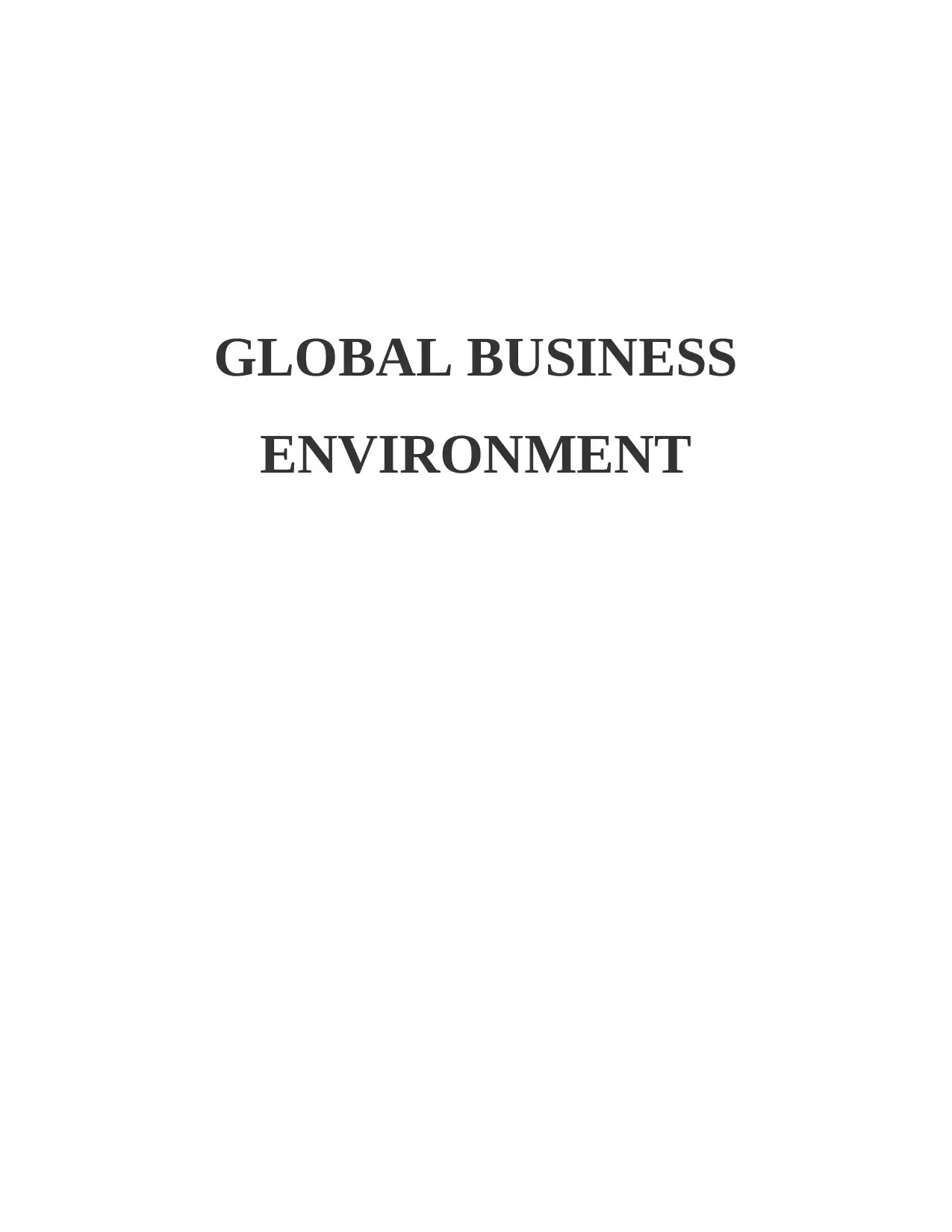
GLOBAL BUSINESS
ENVIRONMENT
ENVIRONMENT
Paraphrase This Document
Need a fresh take? Get an instant paraphrase of this document with our AI Paraphraser
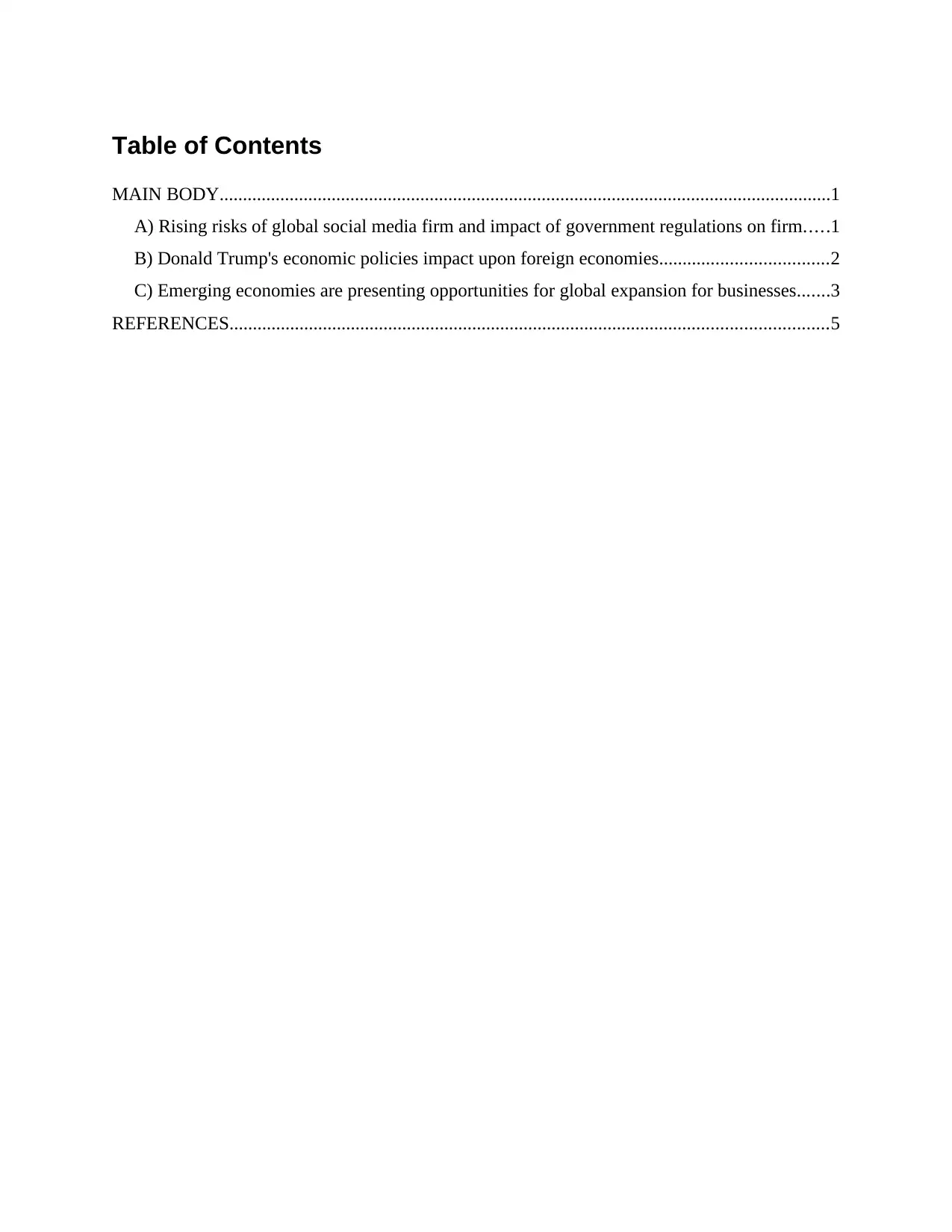
Table of Contents
MAIN BODY...................................................................................................................................1
A) Rising risks of global social media firm and impact of government regulations on firm.....1
B) Donald Trump's economic policies impact upon foreign economies....................................2
C) Emerging economies are presenting opportunities for global expansion for businesses.......3
REFERENCES................................................................................................................................5
MAIN BODY...................................................................................................................................1
A) Rising risks of global social media firm and impact of government regulations on firm.....1
B) Donald Trump's economic policies impact upon foreign economies....................................2
C) Emerging economies are presenting opportunities for global expansion for businesses.......3
REFERENCES................................................................................................................................5
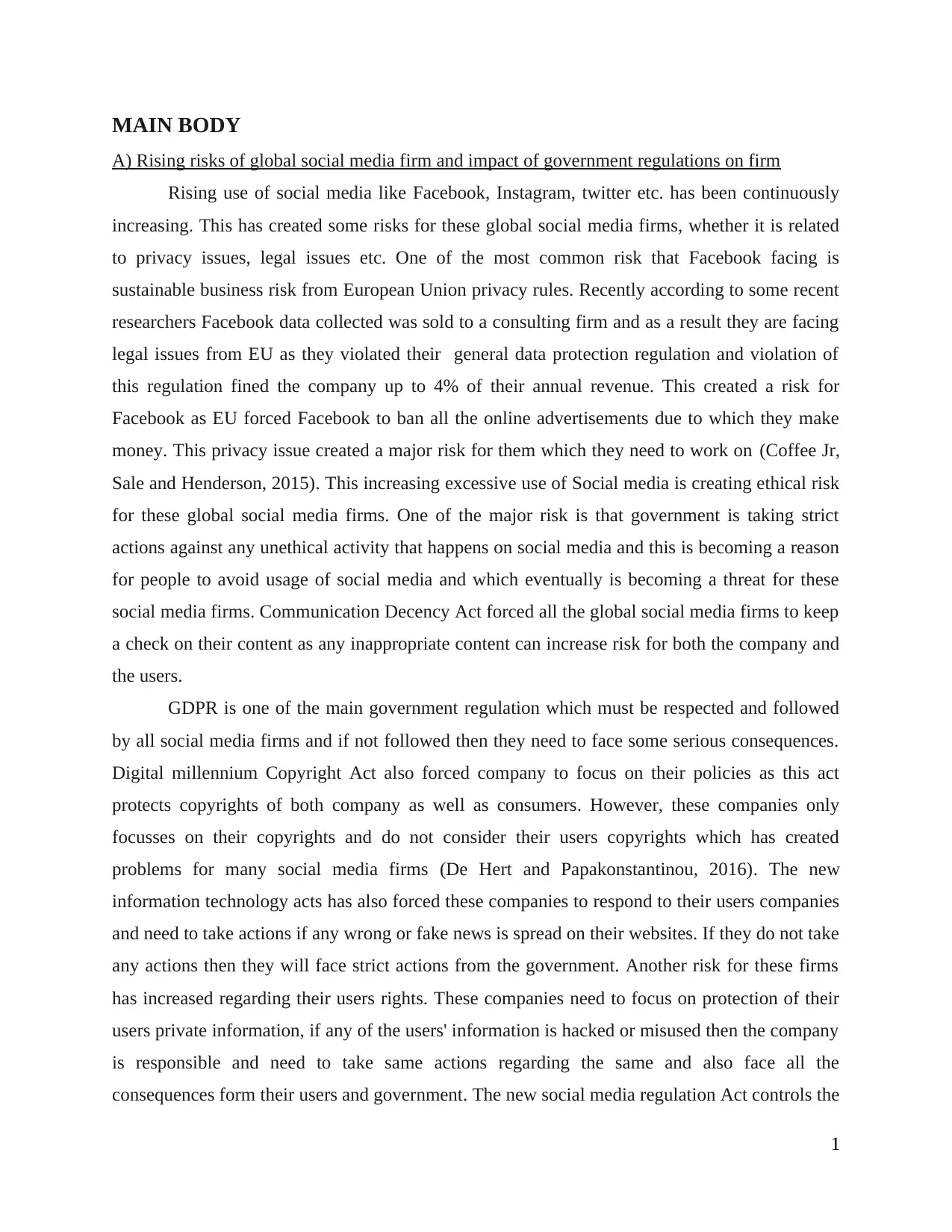
MAIN BODY
A) Rising risks of global social media firm and impact of government regulations on firm
Rising use of social media like Facebook, Instagram, twitter etc. has been continuously
increasing. This has created some risks for these global social media firms, whether it is related
to privacy issues, legal issues etc. One of the most common risk that Facebook facing is
sustainable business risk from European Union privacy rules. Recently according to some recent
researchers Facebook data collected was sold to a consulting firm and as a result they are facing
legal issues from EU as they violated their general data protection regulation and violation of
this regulation fined the company up to 4% of their annual revenue. This created a risk for
Facebook as EU forced Facebook to ban all the online advertisements due to which they make
money. This privacy issue created a major risk for them which they need to work on (Coffee Jr,
Sale and Henderson, 2015). This increasing excessive use of Social media is creating ethical risk
for these global social media firms. One of the major risk is that government is taking strict
actions against any unethical activity that happens on social media and this is becoming a reason
for people to avoid usage of social media and which eventually is becoming a threat for these
social media firms. Communication Decency Act forced all the global social media firms to keep
a check on their content as any inappropriate content can increase risk for both the company and
the users.
GDPR is one of the main government regulation which must be respected and followed
by all social media firms and if not followed then they need to face some serious consequences.
Digital millennium Copyright Act also forced company to focus on their policies as this act
protects copyrights of both company as well as consumers. However, these companies only
focusses on their copyrights and do not consider their users copyrights which has created
problems for many social media firms (De Hert and Papakonstantinou, 2016). The new
information technology acts has also forced these companies to respond to their users companies
and need to take actions if any wrong or fake news is spread on their websites. If they do not take
any actions then they will face strict actions from the government. Another risk for these firms
has increased regarding their users rights. These companies need to focus on protection of their
users private information, if any of the users' information is hacked or misused then the company
is responsible and need to take same actions regarding the same and also face all the
consequences form their users and government. The new social media regulation Act controls the
1
A) Rising risks of global social media firm and impact of government regulations on firm
Rising use of social media like Facebook, Instagram, twitter etc. has been continuously
increasing. This has created some risks for these global social media firms, whether it is related
to privacy issues, legal issues etc. One of the most common risk that Facebook facing is
sustainable business risk from European Union privacy rules. Recently according to some recent
researchers Facebook data collected was sold to a consulting firm and as a result they are facing
legal issues from EU as they violated their general data protection regulation and violation of
this regulation fined the company up to 4% of their annual revenue. This created a risk for
Facebook as EU forced Facebook to ban all the online advertisements due to which they make
money. This privacy issue created a major risk for them which they need to work on (Coffee Jr,
Sale and Henderson, 2015). This increasing excessive use of Social media is creating ethical risk
for these global social media firms. One of the major risk is that government is taking strict
actions against any unethical activity that happens on social media and this is becoming a reason
for people to avoid usage of social media and which eventually is becoming a threat for these
social media firms. Communication Decency Act forced all the global social media firms to keep
a check on their content as any inappropriate content can increase risk for both the company and
the users.
GDPR is one of the main government regulation which must be respected and followed
by all social media firms and if not followed then they need to face some serious consequences.
Digital millennium Copyright Act also forced company to focus on their policies as this act
protects copyrights of both company as well as consumers. However, these companies only
focusses on their copyrights and do not consider their users copyrights which has created
problems for many social media firms (De Hert and Papakonstantinou, 2016). The new
information technology acts has also forced these companies to respond to their users companies
and need to take actions if any wrong or fake news is spread on their websites. If they do not take
any actions then they will face strict actions from the government. Another risk for these firms
has increased regarding their users rights. These companies need to focus on protection of their
users private information, if any of the users' information is hacked or misused then the company
is responsible and need to take same actions regarding the same and also face all the
consequences form their users and government. The new social media regulation Act controls the
1
⊘ This is a preview!⊘
Do you want full access?
Subscribe today to unlock all pages.

Trusted by 1+ million students worldwide
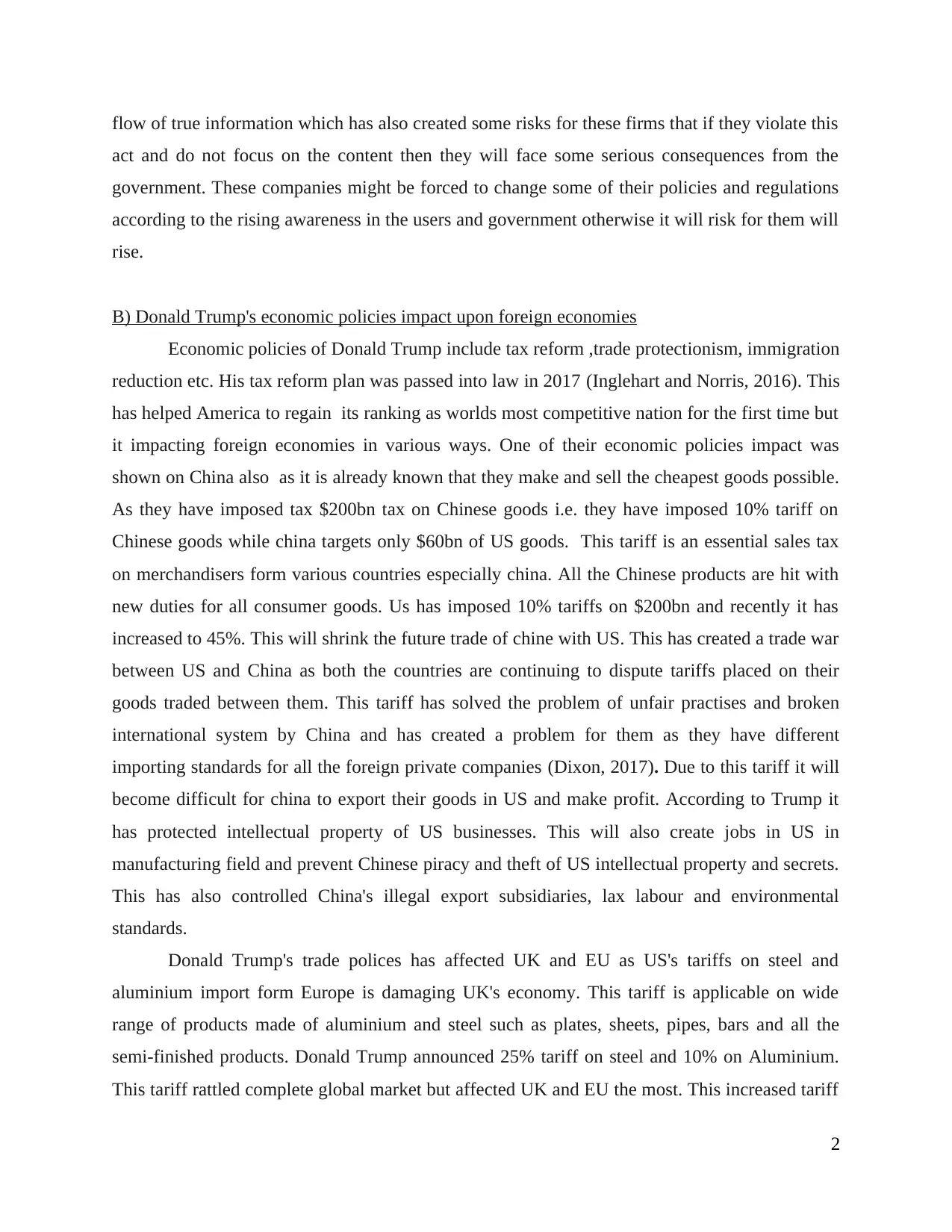
flow of true information which has also created some risks for these firms that if they violate this
act and do not focus on the content then they will face some serious consequences from the
government. These companies might be forced to change some of their policies and regulations
according to the rising awareness in the users and government otherwise it will risk for them will
rise.
B) Donald Trump's economic policies impact upon foreign economies
Economic policies of Donald Trump include tax reform ,trade protectionism, immigration
reduction etc. His tax reform plan was passed into law in 2017 (Inglehart and Norris, 2016). This
has helped America to regain its ranking as worlds most competitive nation for the first time but
it impacting foreign economies in various ways. One of their economic policies impact was
shown on China also as it is already known that they make and sell the cheapest goods possible.
As they have imposed tax $200bn tax on Chinese goods i.e. they have imposed 10% tariff on
Chinese goods while china targets only $60bn of US goods. This tariff is an essential sales tax
on merchandisers form various countries especially china. All the Chinese products are hit with
new duties for all consumer goods. Us has imposed 10% tariffs on $200bn and recently it has
increased to 45%. This will shrink the future trade of chine with US. This has created a trade war
between US and China as both the countries are continuing to dispute tariffs placed on their
goods traded between them. This tariff has solved the problem of unfair practises and broken
international system by China and has created a problem for them as they have different
importing standards for all the foreign private companies (Dixon, 2017). Due to this tariff it will
become difficult for china to export their goods in US and make profit. According to Trump it
has protected intellectual property of US businesses. This will also create jobs in US in
manufacturing field and prevent Chinese piracy and theft of US intellectual property and secrets.
This has also controlled China's illegal export subsidiaries, lax labour and environmental
standards.
Donald Trump's trade polices has affected UK and EU as US's tariffs on steel and
aluminium import form Europe is damaging UK's economy. This tariff is applicable on wide
range of products made of aluminium and steel such as plates, sheets, pipes, bars and all the
semi-finished products. Donald Trump announced 25% tariff on steel and 10% on Aluminium.
This tariff rattled complete global market but affected UK and EU the most. This increased tariff
2
act and do not focus on the content then they will face some serious consequences from the
government. These companies might be forced to change some of their policies and regulations
according to the rising awareness in the users and government otherwise it will risk for them will
rise.
B) Donald Trump's economic policies impact upon foreign economies
Economic policies of Donald Trump include tax reform ,trade protectionism, immigration
reduction etc. His tax reform plan was passed into law in 2017 (Inglehart and Norris, 2016). This
has helped America to regain its ranking as worlds most competitive nation for the first time but
it impacting foreign economies in various ways. One of their economic policies impact was
shown on China also as it is already known that they make and sell the cheapest goods possible.
As they have imposed tax $200bn tax on Chinese goods i.e. they have imposed 10% tariff on
Chinese goods while china targets only $60bn of US goods. This tariff is an essential sales tax
on merchandisers form various countries especially china. All the Chinese products are hit with
new duties for all consumer goods. Us has imposed 10% tariffs on $200bn and recently it has
increased to 45%. This will shrink the future trade of chine with US. This has created a trade war
between US and China as both the countries are continuing to dispute tariffs placed on their
goods traded between them. This tariff has solved the problem of unfair practises and broken
international system by China and has created a problem for them as they have different
importing standards for all the foreign private companies (Dixon, 2017). Due to this tariff it will
become difficult for china to export their goods in US and make profit. According to Trump it
has protected intellectual property of US businesses. This will also create jobs in US in
manufacturing field and prevent Chinese piracy and theft of US intellectual property and secrets.
This has also controlled China's illegal export subsidiaries, lax labour and environmental
standards.
Donald Trump's trade polices has affected UK and EU as US's tariffs on steel and
aluminium import form Europe is damaging UK's economy. This tariff is applicable on wide
range of products made of aluminium and steel such as plates, sheets, pipes, bars and all the
semi-finished products. Donald Trump announced 25% tariff on steel and 10% on Aluminium.
This tariff rattled complete global market but affected UK and EU the most. This increased tariff
2
Paraphrase This Document
Need a fresh take? Get an instant paraphrase of this document with our AI Paraphraser
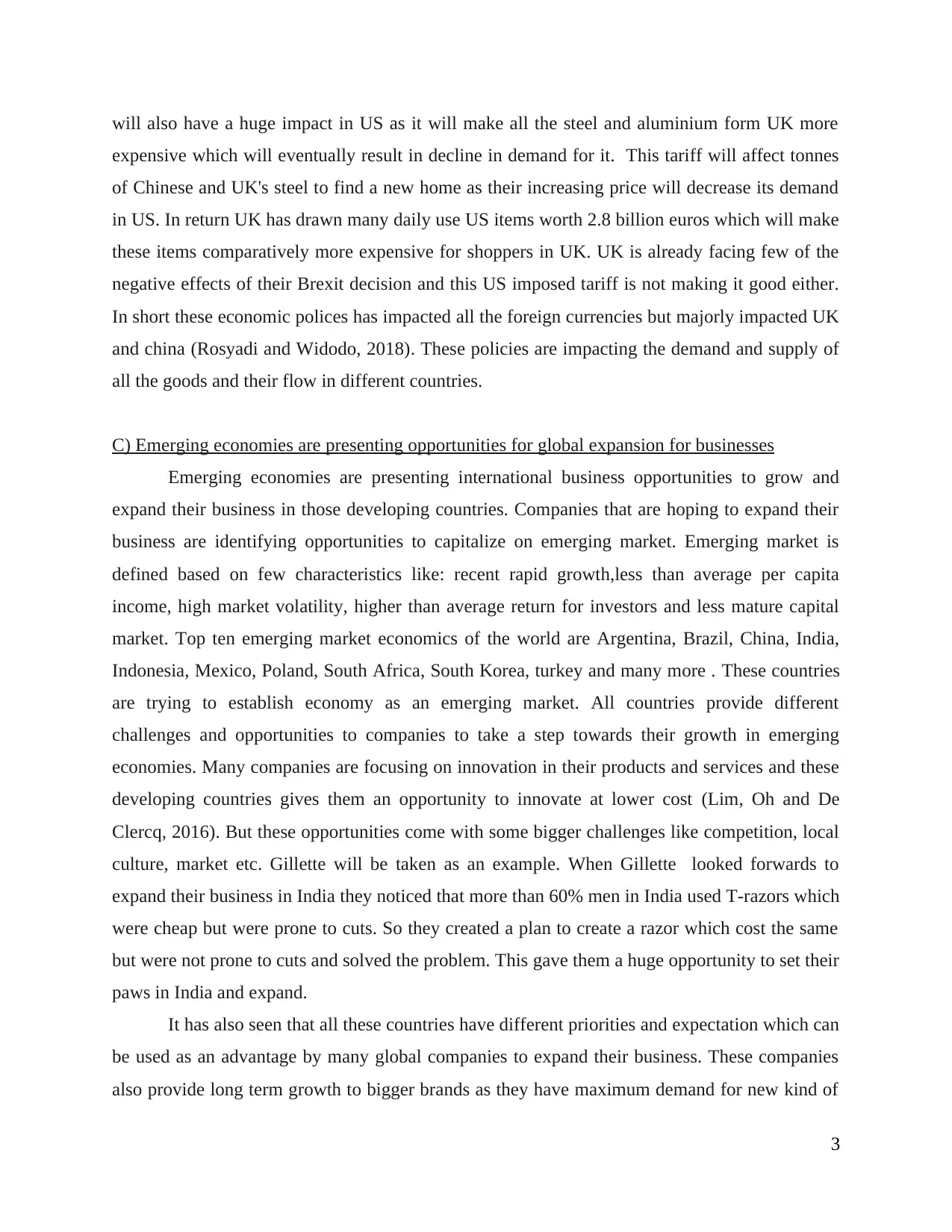
will also have a huge impact in US as it will make all the steel and aluminium form UK more
expensive which will eventually result in decline in demand for it. This tariff will affect tonnes
of Chinese and UK's steel to find a new home as their increasing price will decrease its demand
in US. In return UK has drawn many daily use US items worth 2.8 billion euros which will make
these items comparatively more expensive for shoppers in UK. UK is already facing few of the
negative effects of their Brexit decision and this US imposed tariff is not making it good either.
In short these economic polices has impacted all the foreign currencies but majorly impacted UK
and china (Rosyadi and Widodo, 2018). These policies are impacting the demand and supply of
all the goods and their flow in different countries.
C) Emerging economies are presenting opportunities for global expansion for businesses
Emerging economies are presenting international business opportunities to grow and
expand their business in those developing countries. Companies that are hoping to expand their
business are identifying opportunities to capitalize on emerging market. Emerging market is
defined based on few characteristics like: recent rapid growth,less than average per capita
income, high market volatility, higher than average return for investors and less mature capital
market. Top ten emerging market economics of the world are Argentina, Brazil, China, India,
Indonesia, Mexico, Poland, South Africa, South Korea, turkey and many more . These countries
are trying to establish economy as an emerging market. All countries provide different
challenges and opportunities to companies to take a step towards their growth in emerging
economies. Many companies are focusing on innovation in their products and services and these
developing countries gives them an opportunity to innovate at lower cost (Lim, Oh and De
Clercq, 2016). But these opportunities come with some bigger challenges like competition, local
culture, market etc. Gillette will be taken as an example. When Gillette looked forwards to
expand their business in India they noticed that more than 60% men in India used T-razors which
were cheap but were prone to cuts. So they created a plan to create a razor which cost the same
but were not prone to cuts and solved the problem. This gave them a huge opportunity to set their
paws in India and expand.
It has also seen that all these countries have different priorities and expectation which can
be used as an advantage by many global companies to expand their business. These companies
also provide long term growth to bigger brands as they have maximum demand for new kind of
3
expensive which will eventually result in decline in demand for it. This tariff will affect tonnes
of Chinese and UK's steel to find a new home as their increasing price will decrease its demand
in US. In return UK has drawn many daily use US items worth 2.8 billion euros which will make
these items comparatively more expensive for shoppers in UK. UK is already facing few of the
negative effects of their Brexit decision and this US imposed tariff is not making it good either.
In short these economic polices has impacted all the foreign currencies but majorly impacted UK
and china (Rosyadi and Widodo, 2018). These policies are impacting the demand and supply of
all the goods and their flow in different countries.
C) Emerging economies are presenting opportunities for global expansion for businesses
Emerging economies are presenting international business opportunities to grow and
expand their business in those developing countries. Companies that are hoping to expand their
business are identifying opportunities to capitalize on emerging market. Emerging market is
defined based on few characteristics like: recent rapid growth,less than average per capita
income, high market volatility, higher than average return for investors and less mature capital
market. Top ten emerging market economics of the world are Argentina, Brazil, China, India,
Indonesia, Mexico, Poland, South Africa, South Korea, turkey and many more . These countries
are trying to establish economy as an emerging market. All countries provide different
challenges and opportunities to companies to take a step towards their growth in emerging
economies. Many companies are focusing on innovation in their products and services and these
developing countries gives them an opportunity to innovate at lower cost (Lim, Oh and De
Clercq, 2016). But these opportunities come with some bigger challenges like competition, local
culture, market etc. Gillette will be taken as an example. When Gillette looked forwards to
expand their business in India they noticed that more than 60% men in India used T-razors which
were cheap but were prone to cuts. So they created a plan to create a razor which cost the same
but were not prone to cuts and solved the problem. This gave them a huge opportunity to set their
paws in India and expand.
It has also seen that all these countries have different priorities and expectation which can
be used as an advantage by many global companies to expand their business. These companies
also provide long term growth to bigger brands as they have maximum demand for new kind of
3
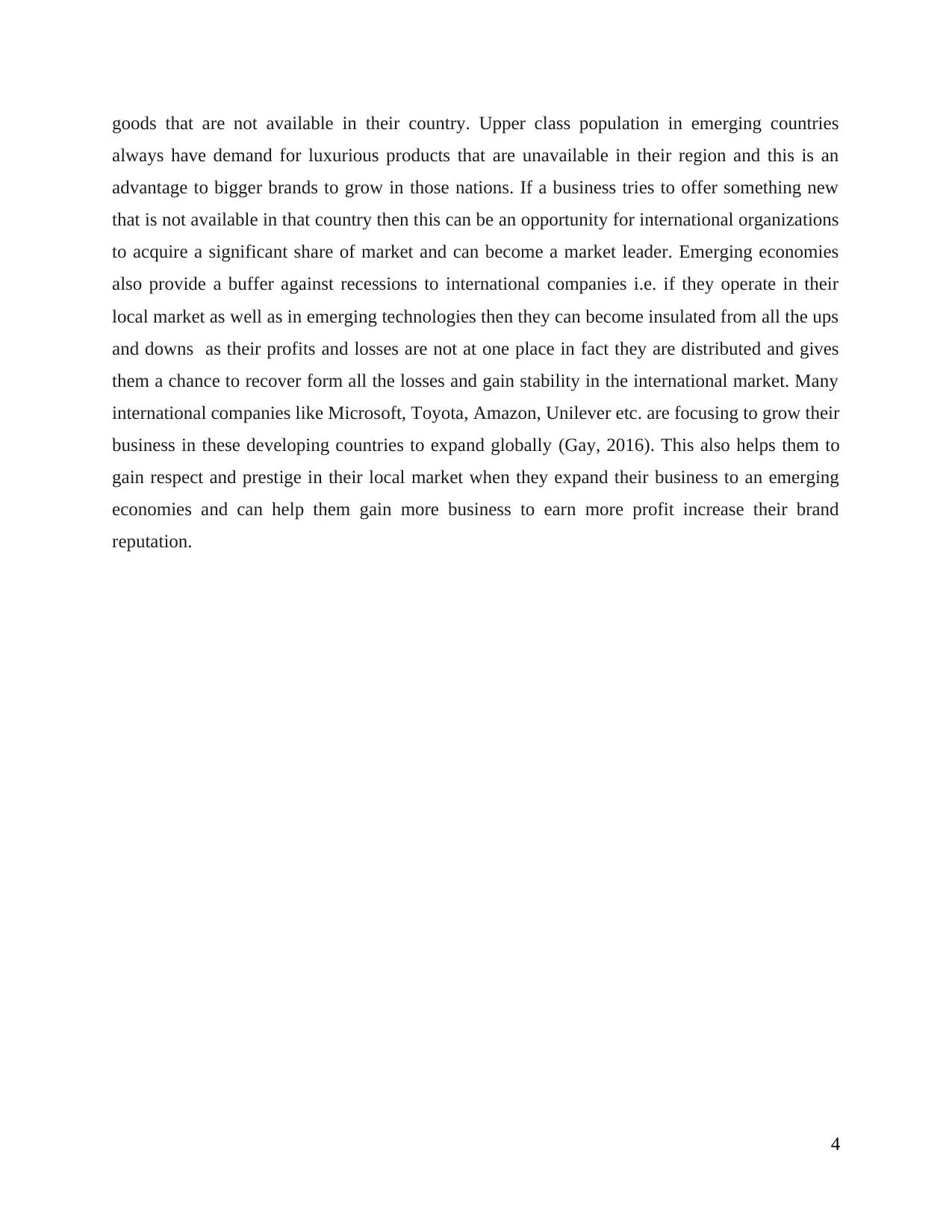
goods that are not available in their country. Upper class population in emerging countries
always have demand for luxurious products that are unavailable in their region and this is an
advantage to bigger brands to grow in those nations. If a business tries to offer something new
that is not available in that country then this can be an opportunity for international organizations
to acquire a significant share of market and can become a market leader. Emerging economies
also provide a buffer against recessions to international companies i.e. if they operate in their
local market as well as in emerging technologies then they can become insulated from all the ups
and downs as their profits and losses are not at one place in fact they are distributed and gives
them a chance to recover form all the losses and gain stability in the international market. Many
international companies like Microsoft, Toyota, Amazon, Unilever etc. are focusing to grow their
business in these developing countries to expand globally (Gay, 2016). This also helps them to
gain respect and prestige in their local market when they expand their business to an emerging
economies and can help them gain more business to earn more profit increase their brand
reputation.
4
always have demand for luxurious products that are unavailable in their region and this is an
advantage to bigger brands to grow in those nations. If a business tries to offer something new
that is not available in that country then this can be an opportunity for international organizations
to acquire a significant share of market and can become a market leader. Emerging economies
also provide a buffer against recessions to international companies i.e. if they operate in their
local market as well as in emerging technologies then they can become insulated from all the ups
and downs as their profits and losses are not at one place in fact they are distributed and gives
them a chance to recover form all the losses and gain stability in the international market. Many
international companies like Microsoft, Toyota, Amazon, Unilever etc. are focusing to grow their
business in these developing countries to expand globally (Gay, 2016). This also helps them to
gain respect and prestige in their local market when they expand their business to an emerging
economies and can help them gain more business to earn more profit increase their brand
reputation.
4
⊘ This is a preview!⊘
Do you want full access?
Subscribe today to unlock all pages.

Trusted by 1+ million students worldwide
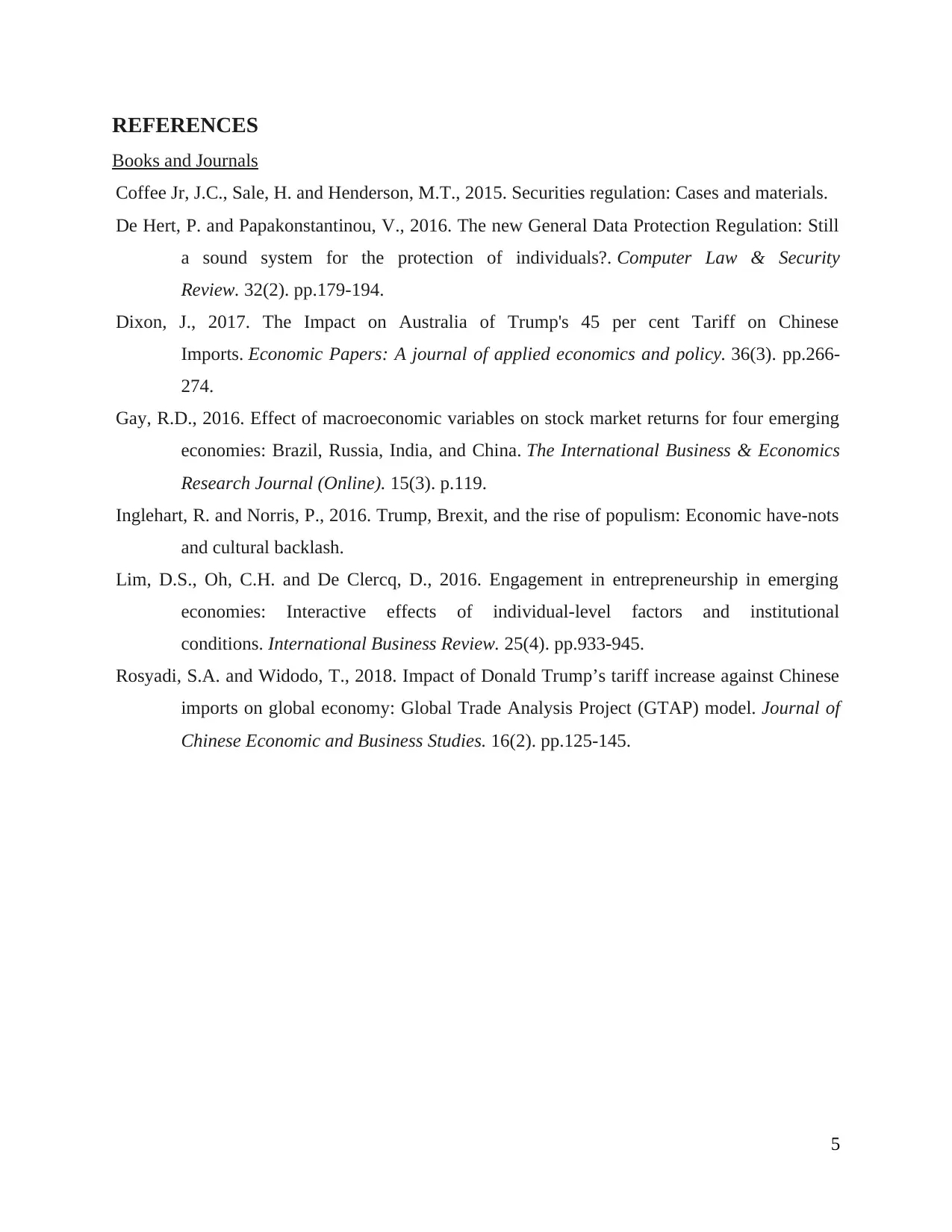
REFERENCES
Books and Journals
Coffee Jr, J.C., Sale, H. and Henderson, M.T., 2015. Securities regulation: Cases and materials.
De Hert, P. and Papakonstantinou, V., 2016. The new General Data Protection Regulation: Still
a sound system for the protection of individuals?. Computer Law & Security
Review. 32(2). pp.179-194.
Dixon, J., 2017. The Impact on Australia of Trump's 45 per cent Tariff on Chinese
Imports. Economic Papers: A journal of applied economics and policy. 36(3). pp.266-
274.
Gay, R.D., 2016. Effect of macroeconomic variables on stock market returns for four emerging
economies: Brazil, Russia, India, and China. The International Business & Economics
Research Journal (Online). 15(3). p.119.
Inglehart, R. and Norris, P., 2016. Trump, Brexit, and the rise of populism: Economic have-nots
and cultural backlash.
Lim, D.S., Oh, C.H. and De Clercq, D., 2016. Engagement in entrepreneurship in emerging
economies: Interactive effects of individual-level factors and institutional
conditions. International Business Review. 25(4). pp.933-945.
Rosyadi, S.A. and Widodo, T., 2018. Impact of Donald Trump’s tariff increase against Chinese
imports on global economy: Global Trade Analysis Project (GTAP) model. Journal of
Chinese Economic and Business Studies. 16(2). pp.125-145.
5
Books and Journals
Coffee Jr, J.C., Sale, H. and Henderson, M.T., 2015. Securities regulation: Cases and materials.
De Hert, P. and Papakonstantinou, V., 2016. The new General Data Protection Regulation: Still
a sound system for the protection of individuals?. Computer Law & Security
Review. 32(2). pp.179-194.
Dixon, J., 2017. The Impact on Australia of Trump's 45 per cent Tariff on Chinese
Imports. Economic Papers: A journal of applied economics and policy. 36(3). pp.266-
274.
Gay, R.D., 2016. Effect of macroeconomic variables on stock market returns for four emerging
economies: Brazil, Russia, India, and China. The International Business & Economics
Research Journal (Online). 15(3). p.119.
Inglehart, R. and Norris, P., 2016. Trump, Brexit, and the rise of populism: Economic have-nots
and cultural backlash.
Lim, D.S., Oh, C.H. and De Clercq, D., 2016. Engagement in entrepreneurship in emerging
economies: Interactive effects of individual-level factors and institutional
conditions. International Business Review. 25(4). pp.933-945.
Rosyadi, S.A. and Widodo, T., 2018. Impact of Donald Trump’s tariff increase against Chinese
imports on global economy: Global Trade Analysis Project (GTAP) model. Journal of
Chinese Economic and Business Studies. 16(2). pp.125-145.
5
1 out of 7
Related Documents
Your All-in-One AI-Powered Toolkit for Academic Success.
+13062052269
info@desklib.com
Available 24*7 on WhatsApp / Email
![[object Object]](/_next/static/media/star-bottom.7253800d.svg)
Unlock your academic potential
Copyright © 2020–2026 A2Z Services. All Rights Reserved. Developed and managed by ZUCOL.





